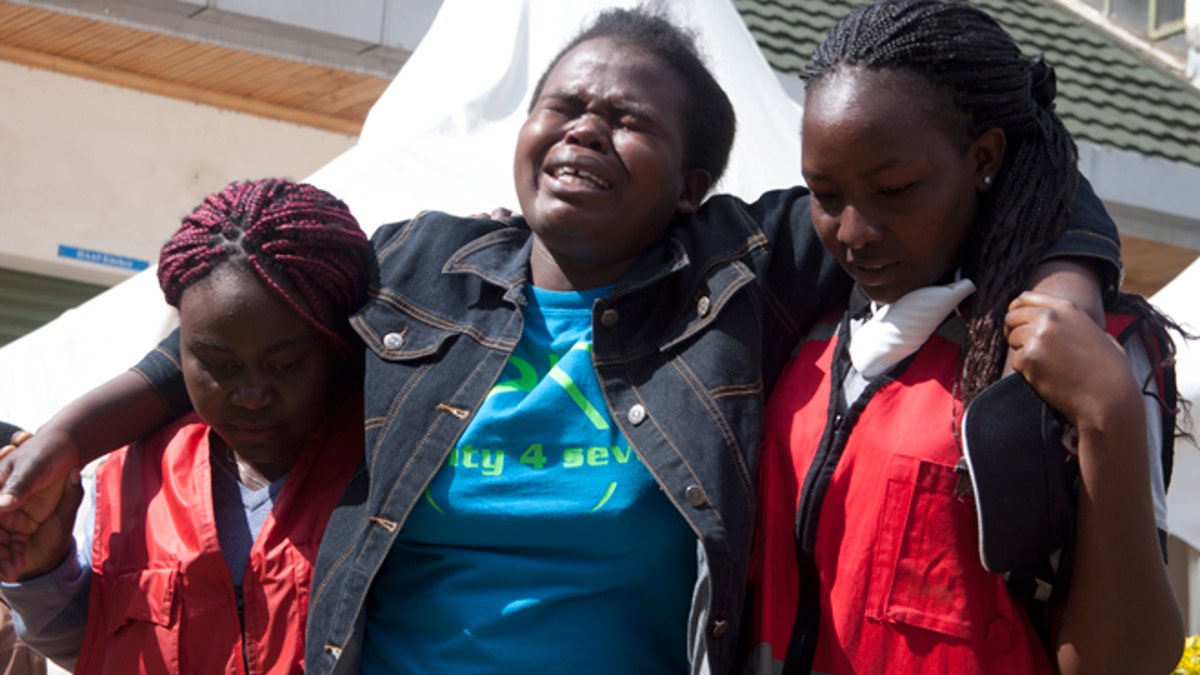
April 8, 2015: Kenya Red Cross staff help a woman after she viewed the body of a relative killed in last Thursday's attack on Garissa University College in northeastern Kenya, at Chiromo funeral home, Nairobi, Kenya. Al-Shabab gunmen rampaged through the university at dawn Thursday, killing over 140 people in the group's deadliest attack in the East African country. (AP Photo/Sayyid Azim)
There were twenty-nine Christian college students gathered for worship that morning at Garissa University, Kenya.
They were standing in a circle holding hands as they prayed when Al Shabaab terrorists entered the back door of the building and immediately shot and killed the young woman leading the entire group. One by one, they proceeded to kill each one of them, laughing as they did so.
The world is far more silent than it could be, and its silence is allowing more men, women and children to be threatened, kidnapped, trafficked, and massacred every week.
The militants then continued on to the school’s dormitories where they separated students by religion, and began executing all of those who were not Muslims. In all, nearly 150 -- mainly Christian -- students were killed that day.
The world is far more silent than it could be, and its silence is allowing more men, women and children to be threatened, kidnapped, trafficked, and massacred every week.
This attack was not indiscriminate.
Al Shabaab, which brazenly live tweeted their siege of Nairobi’s Westgate Mall in 2013, is also in the habit of releasing press releases following their attacks, clearly articulating their motivation.
In contrast to the general western perception of jihadists as impoverished and undereducated victims, Al Shabaab’s releases are in nearly perfect English explaining why their attack was conducted and conducted, by the way, by a group of jihadists that included at least one law school graduate whose father is a Kenyan politician.
Their press release read, “[our] attack targeted only non-Muslims, all Muslims were allowed to safely evacuate the premises before executing disbelievers…no amount of precaution or safety measures will be able to guarantee your safety, thwart another attack or prevent another bloodbath from occurring in your cities.”
They came that day for a single purpose – to kill Christians.
The Garissa University attack – which happened just over one week ago – was the latest in a series of escalating threats against Christians by jihadists who feel emboldened by western inaction to similar attacks on Christians in countries like Iraq.
In the last few weeks, two churches were bombed in Pakistan, Egyptian Coptic Christians in the villages of al-Our and el-Galaa were attacked by jihadist mobs, and ISIS commemorated Easter by bombing yet another Syrian church.
The tragedy is that rather than becoming increasingly outraged by these terrorist atrocities, we seem to be becoming desensitized to them.
Take, for instance, the fact that only a few days before the Garissa attack in Kenya the Nigerian terrorist organization Boko Haram kidnapped nearly 500 women and children from a city in northeastern Nigeria. What’s most striking about this most recent attack is that nearly no one in the world knows it happened as opposed to a similar incident one year ago that sparked global outrage and a social media campaign where millions tweeted: #BringBackOurGirls.
This time you could hear a cricket chirp.
There are no trending hash tags and hardly any news; just a haunting silence, and the silence is most poignant in the halls of power in the United States and Europe.
Pope Francis was right to call out the world for its “complicit silence” during his Easter homily. Because, as the archbishop of Washington, Cardinal Donald Wuerl, has noted “these atrocities happen because there are those who commit them and those who simply remain silent.”
The world is far more silent than it could be, and its silence is allowing more men, women and children to be threatened, kidnapped, trafficked, and massacred every week.
We must speak till we’re heard and put unrelenting pressure on global leaders till we cannot be ignored. These vulnerable communities need protection now because #ChristianLivesMatter.








































